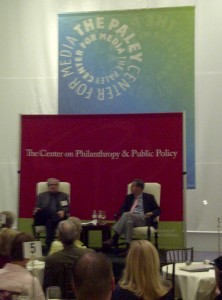 Last night I attended “Conversations on Philanthropy: Philanthropy and the Arts.” California Institute of the Arts President, Steven Lavine, and former Director of the National Endowment for the Arts, Dana Gioia, led a lively discussion on the case for investing in the arts. Presented by the University of Southern California’s Center on Philanthropy and Public Policy, much of the evening focused on the unique aspects of the arts in Los Angeles with an eye on education. Jim Ferris, the Center’s director, started the discussion off posing the question, “should philanthropy fund the arts versus funding immediate issues such as poverty and health?” The resounding response was that both are important and have their place at the funding table.
Last night I attended “Conversations on Philanthropy: Philanthropy and the Arts.” California Institute of the Arts President, Steven Lavine, and former Director of the National Endowment for the Arts, Dana Gioia, led a lively discussion on the case for investing in the arts. Presented by the University of Southern California’s Center on Philanthropy and Public Policy, much of the evening focused on the unique aspects of the arts in Los Angeles with an eye on education. Jim Ferris, the Center’s director, started the discussion off posing the question, “should philanthropy fund the arts versus funding immediate issues such as poverty and health?” The resounding response was that both are important and have their place at the funding table.
Dana started off saying that “supporting the arts helps create the society that we want to live and that it celebrates the story of what it is to be human.” Steve talked about the importance of arts in the schools and how it leads towards creativity. “It can motivate children to read. Arts give value to discovering students own efficacy. Students from China and Korea want to attend schools in the U.S. as it is creatrivity that drives the entrepreneurial spirit.” Steve emphasized that arts are a “cheap cure for a lot of the problems in our schools.” Dana said that the “private sector needs to take the lead in promoting arts education, as the public sector won’t.” Steve stated that “large scale gifts are not in jeopardy, it is the medium sized gifts that have dried up during the economic downturn and is wreaking havoc with many arts organizations.” Laura Zucker, chair of the Los Angeles County Arts Commission said she is “seeing a lot of great collaborations happening in LA and that this should be promoted.”
While our global competitiveness did not directly come up, I am a big proponent of how arts can help keep children engaged in school. The adding of the “A” to STEM and making it STEAM, (Science Technology, Engineering, Arts, Math) with the goal of preparing students to meet the needs of the rapidly changing job market, is critical to the successful future of our country. http://cppp.usc.edu/
